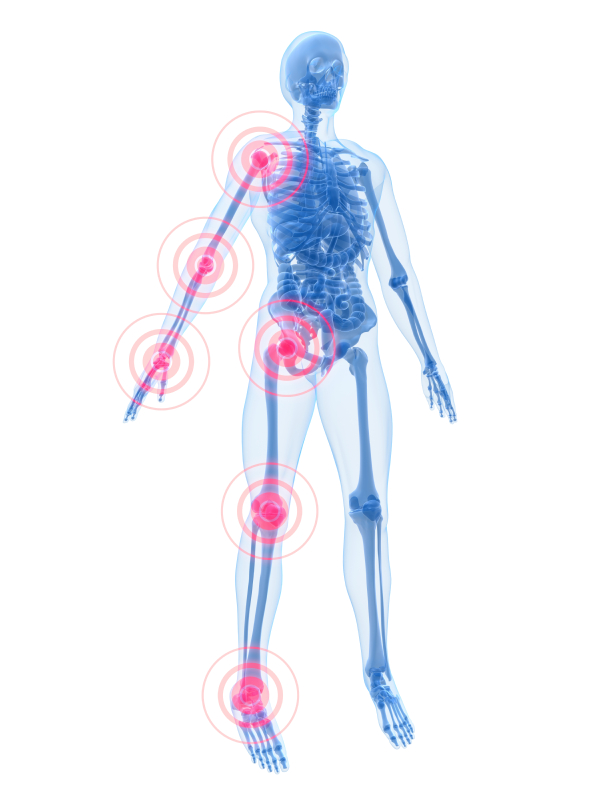The 1 Nutrient That STOPS Fat Cells From Forming

You may know that inflammation, when present after an acute injury, is a good and beneficial response in your body.
When there is an injury present, your body sends an inflammatory response, along with blood and nutrients, to the injured area to speed healing and protect it from further injury.
However, when the inflammatory response fails to shut down, this could lead to low-level, chronic inflammation in your body, which could lead to damage to the cells of your body.
In fact, it has been shown that low-level, chronic inflammation may impair your immune system, lead to inflamed and sick cells, and could even cause pain.
When inflammation targets your fat cells, typically called adipose tissue specific inflammation, your fat cells become inflamed which could lead to obesity, insulin resistance, and fat storage in your liver (hepatic steatosis).
However, it has been shown in research that the omega-3 fatty acids found in fish, fish oil, and krill oil may be effective at increasing adipose tissue mass, which could lead to a reduction in inflammation of your adipose tissue.
Now, a new study published in Arteriosclerosis,Thrombosis, and Vascular Biology, could potentially show how omega-3 fatty acids, DHA in particular, work to reduce inflammation and increase fat cell differentiation.
Let me explain…
Fat Cell Anatomy

When you eat a high-fat diet, some of the fat is used for energy, but the rest of the fat is stored in fat cells and saved for later use.
However, when a fat cell reaches full capacity, it sends a signal to immature fat cells, called preadipocytes, to develop into mature fat cells in order to take on new fatty acids.
This process increases in frequency in the presence of inflammation, which could lead to obesity, dyslipidemia, and fat storage in your liver.
The reason: the cells become inflamed, which prevents them from storing fatty acids.
This results in more circulating fatty acids in your blood, which could deposit in other cells and organs in your body.
However, it has been shown that omega-3 fatty acids may have the ability to reduce the inflammation response, therefore improving inflammation levels in your body and encouraging normal fat cell differentiation.
Cell differentiation, simply put, is when a less specialized cell (preadipocytes) takes on specialized functions of mature fat cells.
The authors of this study aimed to see if the omega-3 fatty acids DHA and EPA could increase adipose differentiation in 3T3-L1 preadipocytes.
The cells were pretreated and differentiated in the presence of different fatty acids including: oleic acid, stearic acid, DHA, EPA, and the combination of DHA and EPA.
After the cells were treated, they saw a significant increase in differentiation in the cells treated with DHA and stearic acid.
Also, they showed that DHA resulted in a four-fold increase in aP2, which is a marker for cell differentiation.
They also noted that DHA and the combination of DHA and EPA resulted in an increase (8.0% and 6.2% respectively) in the expression of C/EBP alpha, which is another marker for cell differentiation.
Stearic acid, but not DHA, was shown to increase the levels of MCP-1, which is an inflammatory marker released from fat cells.

From their work, they concluded that the differentiation of fat cells by DHA is not associated with an activation of inflammatory pathways, suggesting that DHA is beneficial in improving the storage function of adipose tissue.
Although this research is exciting in its findings, more research is needed in order to validate their research for the use of omega-3 fatty acids in the treatment of obesity.
Omega-3 Fatty Acids and Your Health
Omega-3 fatty acids could be effective at improving many different facets of health.
In fact, omega-3 fatty acids have been shown in research to improve heart, brain, eye, and reproductive health.
Now, according to this study, omega-3 fatty acids could increase cell differentiation in your fat cells, and reduce the secretion of pro-inflammatory cytokines, therefore potentially enabling more storage of fatty acids in your fat cells.
Including rich sources of omega-3 fatty acids (by increased fish intake or krill oil supplement) could improve many different aspects of your health; plus, it could prevent the increased production and release of pro-inflammatory cytokines from your fat cells.
References:
Ganesan, M. Clevenger, M. Desouza, C. Sarawarthi, V. Abstract 142: Effects of Omega-3 Fatty Acids on 3T3-L1 Preadipocyte Differentiation and Inflammatory Response. Arterioscler Thromb Vasc Biol. 2012. Vol. 32:A1-42.
About Jayson Hunter & Jaylab Pro

Jaylab Pro was founded by Registered Dietitian Jayson Hunter. Jayson has been recognized as one of America's foremost weight loss experts by America's Premier Experts™. He has also been featured in USA Today for this accomplishment. Jayson is also a best-selling author having co-authored multiple books in health & fitness and business growth. Jayson and the Jaylab Pro team are proud to create content that helps improve the lives of millions of people around the world. We hope you enjoy it just as much as others have.
 If you order a JayLabPro SmartShip product or any Combo Package, we will automatically ship you a new supply of the product or products you have ordered every month, starting 30 days after your initial order is shipped, and continuing until you cancel. The credit card you are using today will be billed the lowest available price for those product or products when your order is shipped, but shipping will be FREE. You may log into your customer account or call our customer service department toll-free at 1-888-9GETPRO (1-888-943-8776) between the hours of 8am – 9pm EST Mon-Fri to cancel future shipments, customize the timing of your shipments, or change the credit card used for billing.
If you order a JayLabPro SmartShip product or any Combo Package, we will automatically ship you a new supply of the product or products you have ordered every month, starting 30 days after your initial order is shipped, and continuing until you cancel. The credit card you are using today will be billed the lowest available price for those product or products when your order is shipped, but shipping will be FREE. You may log into your customer account or call our customer service department toll-free at 1-888-9GETPRO (1-888-943-8776) between the hours of 8am – 9pm EST Mon-Fri to cancel future shipments, customize the timing of your shipments, or change the credit card used for billing.











